The average American consumes 19 pounds of eggs each year, so there's no reason to doubt that eggs are one of the country's most popular sources of protein. All the hype around eggs is warranted. Aside from being a breakfast staple, eggs are also great for baking and making healthy snacks.


Despite the broad appeal of eggs, you probably aren’t aware that there are many strange and uncommon facts about these delicious breakfast treats. Many false beliefs regarding eggs may discourage us from including them in our diets. Fortunately, we've turned to credible sources so we can confirm the truths and bust the myths for you. Read on to discover the results!
Are Brown Eggs Healthier Than White Eggs?
There are plenty of foods with which we are led to believe that the "brown" variety is superior. Brown bread, brown rice, and brown sugar are said to be better than their white counterparts. However, research has found little difference between brown and white eggs.


They are equivalent in terms of protein, fat, cholesterol, and sodium content. Brown eggs and white eggs are essentially the same things. So, if you're trying to decide between two cartons of eggs at the supermarket, rest assured that the nutritional value and quality won't change, regardless of which shell color you choose.c
Should You Wash Eggs?
To be fair, this is not true everywhere. In some areas, you must wash your eggs before storing them in the fridge. However, in many countries, washing eggs is unnecessary. What's your stance? To prevent salmonella infection, it is recommended that you wash your eggs before eating them if you live in the United States, Japan, Australia, and some Scandinavian nations.


In much of Europe, however, hens are routinely vaccinated, so it's best not to wash the egg to preserve its natural protective coating. If unsure, it is best to consult your country's food regulatory agency.
Are Brighter Yolks From Healthier Hens?
How often do you crack an egg, look at the bright orange yolk, and declare, "This is the best egg in the carton!" However, the chicken's food does play a role in determining the hue of the egg's yolk. Egg yolks can be made brighter by feeding the hen certain plants, such as stinging nettles, alfalfa, or corn.


However, just because the yolk is brighter doesn't mean your chicken was scavenging for it outdoors; food coloring can have the same effect. Just because an egg's yolk is pale in color doesn't indicate it's of worse quality; it could mean that the laying hen isn't consuming any nettles or chemicals.
Are Eggs Appropriate for Infants?
Only about 2% of kids are allergic to eggs, but that doesn't stop parents from worrying that their child will be one of them. Infants under a year old should avoid egg and egg-based products, although this does not apply to all babies and toddlers.


A small amount of egg can be tried out as the first solid food for babies at the seven-month mark. If they don't show signs of an allergy, you can gradually increase the serving. Consult your child's pediatrician if you have any questions about what foods are safe for your infant to consume.
Are Eggs Safe for Pregnant Women?
It's a common misconception that pregnant women who consume eggs can inadvertently introduce their unborn babies to a lifelong allergy to the food. There has never been any evidence to support this; therefore, eating eggs is safe for pregnant women.


Since eggs include essential vitamins, minerals, protein, and amino acids, they are great for pregnant mothers. The only risk comes from eating eggs that have not been thoroughly cooked or that have been uncooked for too long. Of course, this is a general rule that applies to everyone, regardless of whether or not they are pregnant.
Is Every Egg a Potential Baby Chicken?
For some, the idea that an egg could grow into a baby chicken is enough to put them off eating it. But obviously, that is not the case. Simply said, whether or not an egg has been fertilized, it is still nothing more than an egg.Since most hens never come into contact with a male chicken, it's difficult for their eggs to develop into chicks. Store-bought eggs won't hatch into chicks no matter how long you leave them in an incubator. On the other hand, this does not imply that you are unable to purchase fertilized eggs (more on that coming up).


Since most hens never come into contact with a male chicken, it's difficult for their eggs to develop into chicks. Store-bought eggs won't hatch into chicks no matter how long you leave them in an incubator. On the other hand, this does not imply that you are unable to purchase fertilized eggs (more on that coming up).
If You’re on a Diet, Should You Skip the Egg Yolks?
Egg yolks have a poor reputation. As recommended by many diet gurus, egg-white omelets may help you shed some pounds, but does eating only the egg whites give you any health benefits? Not really.


While the egg white has far fewer calories than the egg yolk, this difference is negligible when you factor in other elements. The protein and other minerals found in egg yolks are beneficial to human health. The egg whites don't have any vitamin D, but the yolks do.
Can Eggs Be Pasteurized at Home?
While there are plenty of how-to articles and videos, we regret to inform you that pasteurizing eggs at home is not as easy as it may appear. Because heat is involved in the first step of pasteurizing an egg, some individuals believe that boiling them at a specific temperature is all that’s needed.


However, to pasteurize eggs at home, you'd need some specialized equipment. Those who can't consume unpasteurized eggs shouldn't try to do it themselves, as heat alone might not be enough to kill any harmful bacteria. So, always buy pasteurized eggs instead of trying to go the DIY route.
Are White Eggs and Brown Eggs the Only Two Options?
Eggs in colors other than brown and white are extremely rare, but that doesn't mean they don't exist! Leghorn chickens lay white eggs, while Rhode Island chickens lay brown eggs; these are the only two types of eggs typically sold in grocery stores.
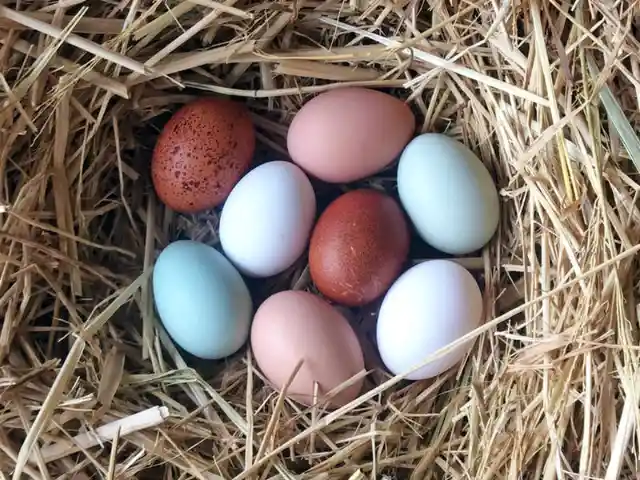
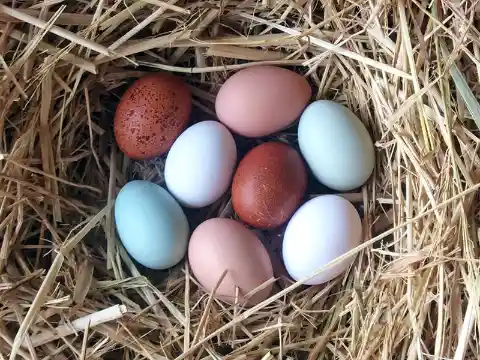
If you know where to look, you can find birds laying green or blue eggs. The Ameraucana and Araucana chickens lay colored eggs, for example. Regardless of the shell color, the quality of the egg inside remains the same. So get out there and find a green or blue egg if you can!
Does It Matter How You Cook Your Eggs?
Eggs are eggs whether they are fried, boiled, or scrambled, right? Actually, no. The nutritional content of eggs can vary greatly depending on how they are prepared. For instance, if you beat your eggs and then bake them at 355 ° F for 40 minutes, you will destroy about 45 percent of the vitamin D.


The Vitamin D content of fried and boiled eggs remains very constant at around 90%. To compare the calorie and protein content of various egg preparations, you can use a fitness tracker like MyFitnessPal. Of course, frying in oil or other fattening ingredients will increase the calorie count.
Is It Unhealthy to Eat Eggs Every Day?
There's a lot of confusion about how often we should eat eggs and whether or not doing so every day is unhealthy. Studies have revealed that those who consume eggs daily have healthier diets than those who don't.


Eggs make a terrific breakfast since they keep us from being hungry early in the day. Delaying hunger pangs is essential for avoiding unhealthy snacking later on. Of course, those with specific health concerns should avoid eating eggs daily. Other than that, research has shown that eating about four to five eggs a day is fine.
Should You Avoid Eggs if You Have High Cholesterol?
People with high cholesterol have long been advised to avoid foods and drinks suspected to raise cholesterol levels even further. Although they’ve spent plenty of time on the forbidden foods list, eggs may not be as harmful as formerly assumed. In fact, recent reputable studies suggest the opposite may be true.


Yolks have more fat and cholesterol than whites, but not all fats are harmful, and eating yolks does not inevitably raise blood cholesterol levels. One egg a day isn't likely to cause any problems, but it's wise to consult with your doctor first.
How Can You Tell if an Egg Is Still Good?
It can be a pain trying to figure out how fresh eggs are, whether you're getting them from your own chickens at home or you've simply had a carton sitting in the back of your fridge for a while. There is a more reliable way to determine the age of your eggs than randomly cracking them open and crossing your fingers. Put them in a bowl of water and watch what happens.


They are at their freshest when they settle to the bottom and lie flat. If the egg rises to the water's surface, it is likely quite old. Use the floating test to determine whether or not an egg is still edible before tossing it in the garbage.
Do Egg Whites Reduce Wrinkles?
A recent trend in cosmetics involves applying egg whites to one's face. If you're a frequent user of either YouTube or Pinterest, you may have already seen this trend. Everyone appears to have tried homemade egg white face masks for wrinkles, but are they effective? That depends on a few variables.


Wrinkles can be minimized by a thin membrane formed on the skin's surface by the whites, although this effect is temporary and will be removed by washing the face. This means that, at most, it is a stopgap measure. Eating eggs, on the other hand, will provide you with the vitamins and nutrients your body needs to stay youthful and healthy.
Are Free-Range Eggs Better for You Than Caged Eggs?
A common misconception is that eggs from free-range or pastured hens are superior to those from caged ones. A "six of one, half a dozen of another" description fits this circumstance well. Vitamins A, D, and E, as well as omega-3, are more abundant in eggs from free-range chickens.


However, they also have a much higher risk of becoming sick or hurt than caged hens. There is also a misconception concerning the living conditions of free-range chickens, but we will discuss that in a little more detail later.
Do Free-Range Chickens Live Outside All the Time?
One popular myth is that free-range, cage-free, and pastured hens are just left in a field to enjoy their days. However, this is sadly not true. USDA regulations mandate cage-free hens to have access to outdoor spaces, but the agency does not specify the amount of time or floor area each hen must-have.


The result is that free-range chickens spend as much time as possible in sheds or pens, exactly like caged hens. Having some outside space is better than none, but don't assume these chickens have a field to roam around all day.
Should You Keep Eggs in the Refrigerator Door?
If the egg section in the refrigerator door wasn't intended for eggs, why would manufacturers include it? We may not have the answer to one of life's greatest mysteries, but we are sure that eggs should never be kept in the refrigerator door.
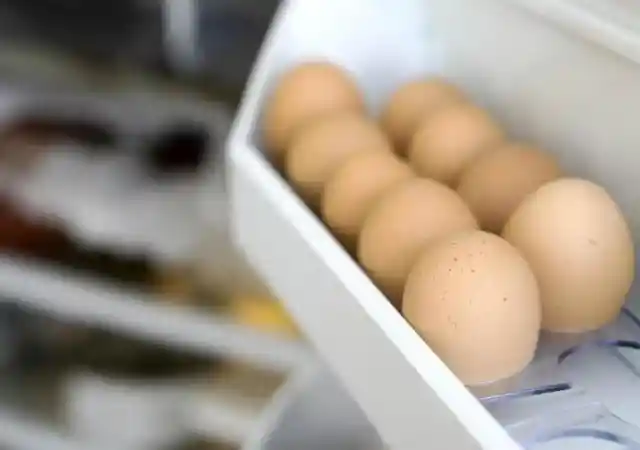

Eggs will remain fresher for a longer period if they are kept at a constant temperature. The door of your refrigerator is the warmest part of the appliance since the temperature there fluctuates every time you open and shut it. The best place for your eggs is on the center shelf of your refrigerator.
Is There More Protein in Fertilized Eggs?
Some people actively seek out fertilized eggs to increase their protein consumption. But there is no evidence to suggest that these eggs are superior to or inferior to the regular, unfertilized variety.
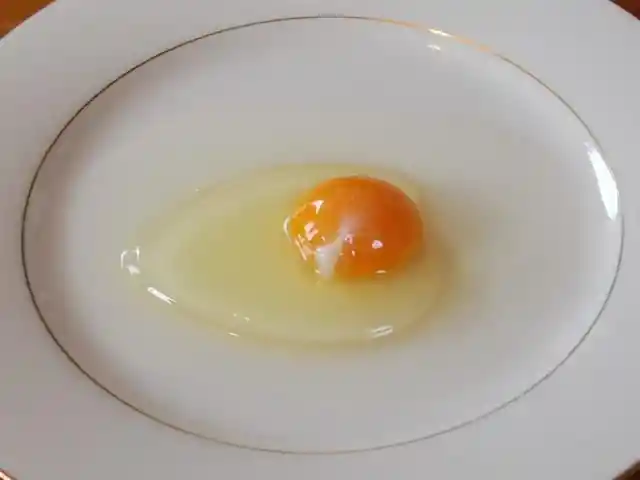
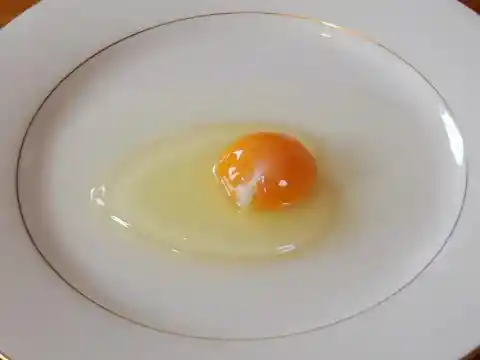
If you want to seek out or avoid consuming fertilized eggs actively, there is a means to do it. Fertile eggs contain a dark spot near the middle, with veins that resemble spider webs. Putting the egg under a torch will allow you to peek inside without breaking the shell.
Are Quail Eggs Healthier Than Other Types of Eggs?
You might have heard that quail eggs are more nutritious than chicken eggs. But is this really the case? Yes and no. A quail egg is healthier than a chicken egg since it contains more nutrients and protein. However, you wouldn't notice much of a difference unless you ate them daily.


If you want to save a lot of money, consuming chicken eggs is preferable to buying more expensive quail eggs. The other issue is that quail eggs are far smaller than chicken eggs, so you'd have to eat more of them to feel full.
Can You Freeze Chicken Eggs?
Did you know that you may freeze your eggs to prevent them from spoiling before you can eat them? Chicken egg freezing isn't something you hear about every day, so many people are surprised to learn it's possible.


However, freezing is the way to go if you want to keep your eggs for a while. Of course, you can't just throw them in whole because their shells would split when frozen. Instead, lightly beat some eggs and pour them into an ice tray to freeze them. Don't forget to defrost them thoroughly before throwing them in the pan.
How Do You Poach an Egg the Easy Way?
One of the most common preparations for eggs in restaurants is poaching. Unfortunately, most of us will not be doing this at home. Why? Because it seems like you need some special tool to poach an egg properly. We're here to inform you that it doesn’t have to be a complex task.


Get the freshest eggs you can find, then bring a big casserole pot of water to a boil and add a splash of white wine vinegar. This will aid in keeping the whites together. If you want to ensure that your egg stays together while cooking, you can decant it into a cup and gently tip it into the pot after having swirled the water with a spoon. In just two minutes, your egg will be perfectly poached.
Are Raw Eggs Healthier Than Boiled Eggs?
Are raw eggs actually healthier than boiled eggs? Not at all. Though the risk of salmonella contamination from eating a raw egg is low (about 1 in 30,000), this does not make them a safe food source.


Raw egg whites are less easily absorbed by our bodies than cooked egg whites, and vitamin B7 might become blocked. Even if you're trying to bulk up, you shouldn't eat raw eggs; if you must, choose ones that have been pasteurized or treated to eliminate salmonella.
What’s the most convenient way to cook eggs?
We've all heard that eating extra eggs will help us feel fuller during breakfast, but how can a person with a hectic schedule make time to cook eggs first thing in the morning? Fortunately, there are many different ways to prepare eggs, making this healthy dish available even to busy people.


Make some egg muffins the night before, and you'll be set for the morning. Beat some eggs, fill a muffin tin with them, and top them with vegetables and cheese. Bake for about 25 minutes, and then let your brekkie muffins cool completely before storing them in the refrigerator. If stored properly, they have a three-day shelf life.
Do You Have to Dispose of Eggs After Their Use-by Date?
Most people don't understand the different expiration dates that appear on food packaging, especially regarding eggs. There are usually two dates printed on egg cartons. The first one is the date it should be sold by, and the second is the date it should be consumed by. The sell-by date indicates the last day a business can keep an item on the shelf without discarding it.


But that doesn't mean the eggs will have gone bad by then. The best indicator of when the eggs are still safe to consume is the "use-by" date. The freshness of an egg can also be determined by other means.
Why Are Hormone-Free Eggs More Expensive?
Nowadays, you can even find hormone-free eggs among the wide varieties of regular, organic, and free-range eggs. Is the high price tag justified, given that these are among the most pricy options? Studies have demonstrated that hormone-free eggs are nutritionally equivalent to regular eggs.


Do you know why this is the case? Because it is illegal to inject any kind of hormone into chickens. What sounds like a more compassionate or traditional method of raising chickens is just a marketing ploy to get you to pay more money.
Is There More Protein in the Yolk or the Egg White?
This information came as quite a shock to us. The protein content is identical in egg whites and yolks, at three grams for each. The fat content, nutrient content, and the number of calories are the primary distinctions.


Three grams of protein can be found in an egg white, but most of the fat and calories can be found in an egg yolk. Therefore, if you remove the yolk from an egg, you can have the same amount of protein while consuming fewer calories. However, we suggest you include egg yolks in your diet due to the abundance of beneficial vitamins they contain.
Why Don’t They Sell Blue Eggs in Supermarkets?
Have you ever seen an egg laid by a chicken that was the color blue? There's a wild tale that explains how these eggs get their beautiful blue color, and it was revealed by the journal PLoS ONE.
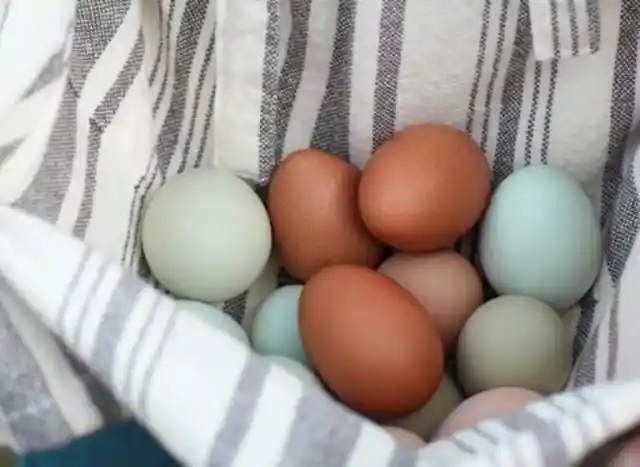

A virus infected a type of native South American hens more than 500 years ago. Because of this infestation, a genetic mutation occurred, leading to an accumulation of a pigment known as biliverdin. This, in turn, caused the hens to lay eggs that were blue and green in color.
What Determines Egg Shell Thickness?
There is a widespread misunderstanding that brown eggs have considerably more robust shells than white eggs. In point of fact, the age of the chicken is the single most important factor in determining the thickness of an egg shell.


While young chickens lay eggs with shells that are more durable, older birds lay eggs with shells that are more delicate. This thickness is something that will occur independently of the breed of chicken used or the color of the egg.
Do Different Colored Eggs Have Different Nutrients?
Eggs that are blue, green, or brown have a more distinctive and intriguing appearance than white eggs do. However, the fact that white eggs do not have any color does not indicate that they are nutritionally deficient. Instead, the variations in the hue of eggshells are entirely attributable to heredity.
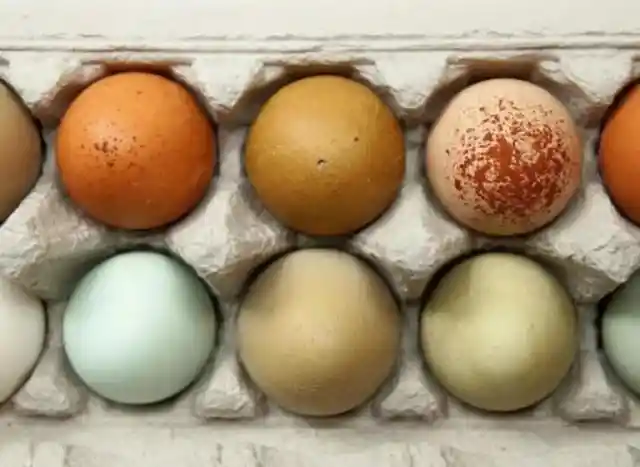
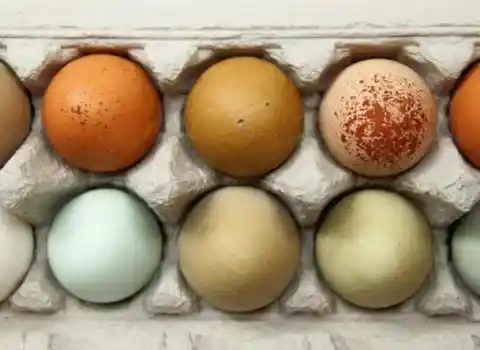
If a chicken that lays blue eggs and a bird that lays white eggs are both grown in the same environment, there will be no difference in the taste or nutrition of the different colored eggs they produce.
Is There a Certain Egg Yolk Color That’s Healthier?
The food of a hen determines the hue of the egg yolk, which can range from a pale yellow to a rich orange to even a vivid red. The yolks of eggs laid by free-range hens are often more vibrant in color than those laid by caged hens because their diets tend to be richer in pigmented, nutrient-rich items like insects and grasses.


However, the yolks of chickens raised on grain will be a paler yellow. Remember how we mentioned that some egg yolks are a vibrant shade of red? Dan Barber, chief chef of New York City's Blue Hill restaurants, collaborated with scientists from Cornell University to create a feed combination rich in red peppers that induced hens to lay eggs with a strawberry hue.
Can You Predict What Color Egg a Chicken Will Lay?
The color of a chicken's earlobes (yes, chickens have earlobes) is an excellent indicator of the color eggshell the bird will lay. This is a bit of an out-there idea, but it is based on scientific fact.


It may sound unusual, but it is actually the case. The eggs from hens with red or brown earlobes tend to be a darker brown, whereas the eggs from hens with white earlobes tend to be lighter in hue.
Do Cartons Contain Eggs of Uniform Size?
Although the label on the carton claims that you will receive "large" eggs, the actual size of each egg contained within the box will vary. So, your “large” eggs may be a mix of medium, large, and extra-large.
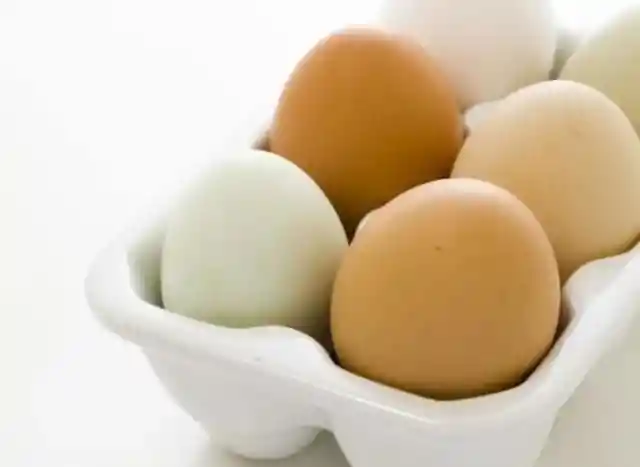

The United States Department of Agriculture does not regulate a specific size or weight for individual eggs; instead, it gives guidelines for the average weight of a dozen eggs. This is because there is a 100% assurance that different characteristics will be present in every single one of the eggs.
Are Free-Range Hens Allowed to Roam Outside?
Despite the fact that "free-range" eggs are an improvement over "cage-free" eggs, the term "free-range" is somewhat misleading to consumers. This is because even though "free-range" hens have the opportunity to go outside, many of them do not actually do so.


The doors to their barns may be too narrow, or they may only remain open for a certain amount of time. In many cases, the doors cannot accommodate the entire flock. Unfortunately, this prevents the hens from enjoying the benefits of having access to the outdoors.
What Are the Best Eggs for Poaching?
The egg whites of an AA quality egg are described as being "clear and firm," whereas the egg whites of an A quality egg are described as being "clean and somewhat firm." Therefore, fresh AA eggs are ideal for poaching since they have the firmest egg whites.


This is important because you will drop an entire raw egg into the water when you poach it. The firmer the egg whites are, the less of the white will be lost in the water while it is cooking.
What Happens to B-Grade Eggs?
Eggs with a quality rating of B are highly uncommon to find for sale at retail establishments. Because of the poor quality of these eggs, they will be used in the production of liquid and powdered egg products for commercial usage.
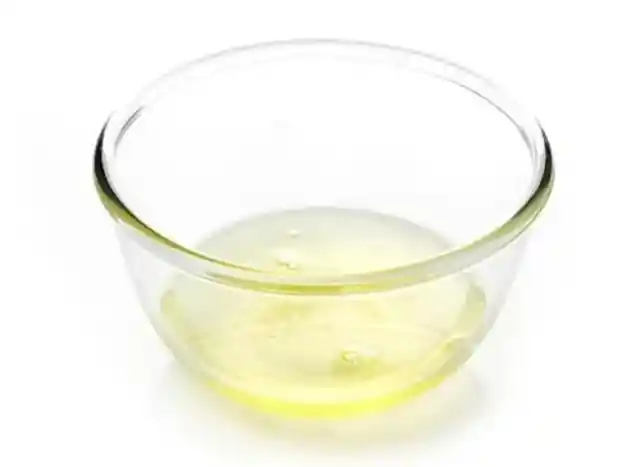
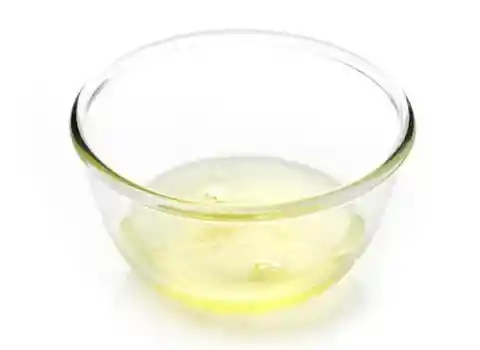
The yolks are not round, the whites are not thick, and there are sometimes blood spots in them. Because of several factors, including the ones outlined above, boxed egg whites are one of the pre-packaged meals that are considered among the least attractive options in the United States.
Are Eggs a Good Source of Omega-3?
You may assume that eggs from hens whose feed is supplemented with flaxseed or fish oil are a good option if you’re looking for omega-3 fatty acids to reduce inflammation, improve cognitive function, and reduce your risk of heart disease. However, they are probably not worth the additional cost.


This claim is more of a promotional tool than anything else. The USDA does not govern it. There is also no way to demonstrate that the eggs contain much more omega-3s than the controls. Chia seeds, wild fatty fish, and organic, pastured eggs are good sources of omega-3s.
Is It Worth Paying More for Brown Eggs?
While it's true that brown eggs often cost more than white eggs, the premium has nothing to do with quality. The hens that produce brown eggs are of a larger breed than the birds that make white eggs, which is reflected in the higher price of brown eggs.


Larger hens have a more significant impact on feed costs due to their greater food consumption. Consumers end up paying more for eggs because of this rise in manufacturing costs. It's not like comparing white bread to whole-grain bread.
Is Cholesterol a Concern When Eating Eggs?
Egg-white omelets are out, and yolks are back in again. Public health professionals in the United States used to think that eating egg yolks would raise your risk of heart disease and stroke because of the cholesterol they contain. Recently, clinical trials have shown that the dietary cholesterol in eggs has a minor impact on blood cholesterol levels.
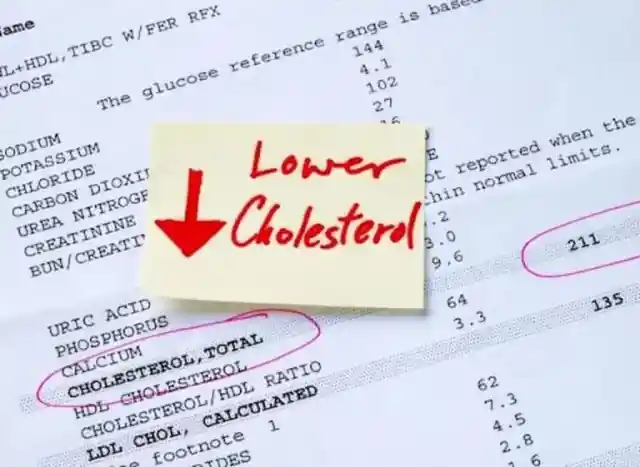
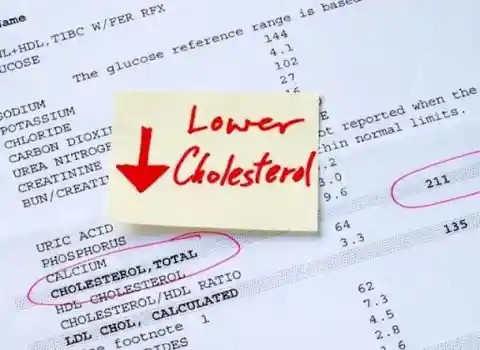
It's so low that the 300 mg daily cholesterol limit was eliminated from the 2015-2020 Dietary Guidelines because there is no correlation between dietary cholesterol and blood cholesterol levels. Eggs, surprisingly, may help reduce cholesterol levels.
Are Eggs a Good Source of Vitamin D?
Most people get their vitamin D from daily exposure to sunlight. You have some dietary options for vitamin D, but the selection is limited. Eggs are one of the best nutritional sources of this vitamin that strengthens the immune system, but they are also the least common.


According to research published in Food Chemistry, baking scrambled eggs at 350 degrees Fahrenheit for forty minutes will destroy more than 50% of their vitamin D content. However, eggs maintain 82-88% of their vitamin D content after being fried or boiled.
Is the Stringy Stuff in the Egg White Dangerous?
The coiled, white strings that are found in clusters along the borders of egg yolks are referred to as chalazae. They are not dangerous at all. In fact, chalazae can be found in most eggs. These coiled membranes connect the yolk to the tip of the shell.


In addition to the fact that these fibers can be digested in any manner, their very existence is actually seen as a favorable sign: the more plainly visible the chalazae are, the more recently the egg was laid.